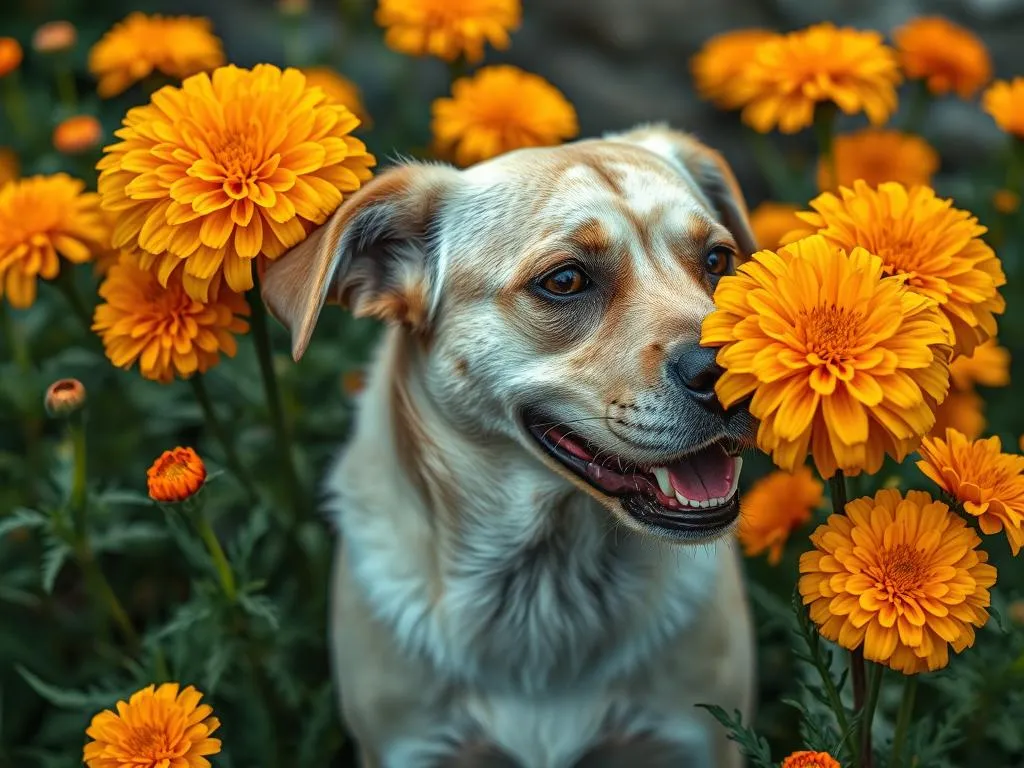
Introduction
As dog owners, ensuring the health and safety of our furry companions is paramount. One important aspect of dog health care is understanding the impact of our environment, including the plants that surround us. Are marigolds poisonous to dogs? This question is a concern for many pet parents, especially those who enjoy gardening or have marigolds in their yards. Understanding toxic plants and their effects on dogs is crucial for preventing accidental exposures and ensuring our pets lead healthy, happy lives.
Understanding Dog Health Care
Importance of Regular Veterinary Checkups
Regular veterinary checkups are essential for maintaining your dog’s health. These visits allow for routine vaccinations and checkups, which help prevent serious illnesses. Early detection of health issues can significantly improve treatment outcomes. Just like humans, dogs can develop various health conditions, and routine vet visits are critical to catch these problems early.
Common Health Issues in Dogs
While dogs are generally healthy, they can suffer from a range of common health issues, including:
- Obesity: Overweight dogs face a higher risk of diabetes, heart disease, and joint problems.
- Dental Issues: Poor dental hygiene can lead to periodontal disease, which can affect other organs.
- Ear Infections: Dogs with floppy ears are more prone to infections.
- Skin Conditions: Allergies and parasites can cause skin irritations.
Recognizing symptoms such as excessive thirst, changes in appetite, or unusual behavior can help you seek veterinary assistance before a minor issue escalates.
Nutrition and Diet
A balanced diet is vital for your dog’s health. It’s important to provide high-quality dog food that meets their specific nutritional needs. Additionally, being aware of food items that are safe versus toxic for dogs can prevent accidental poisoning. Foods like chocolate, grapes, and onions are toxic, while carrots and apples can be healthy treats.
Plants and Their Effects on Dogs
Introduction to Plant Toxicity
Many pet owners may not realize that certain plants can be harmful to their dogs. Plant toxicity can cause a variety of health issues, ranging from mild gastrointestinal upset to severe poisoning. It’s essential to differentiate between common toxic and non-toxic plants.
Signs of Plant Poisoning in Dogs
If a dog ingests a toxic plant, several physical symptoms may arise, including:
- Vomiting
- Diarrhea
- Lethargy
- Difficulty breathing
- Excessive drooling
Behavioral changes, such as restlessness or increased anxiety, can also indicate that something is wrong. Being vigilant about what your dog is consuming outdoors can help mitigate these risks.
Marigolds: A Closer Look
What Are Marigolds?
Marigolds, specifically those belonging to the Tagetes species, are popular garden plants known for their vibrant colors and pest-repelling properties. They are often used in landscaping and are appreciated for their ability to deter certain insects.
Are Marigolds Poisonous to Dogs?
When it comes to the question, “Are marigolds poisonous to dogs?”, the answer is generally no. Marigolds are not considered toxic to dogs. However, while they are not poisonous in the traditional sense, ingestion can still lead to mild gastrointestinal upset. Studies and expert opinions suggest that while marigolds are safe in small amounts, they can cause discomfort if consumed in larger quantities.
Symptoms of Marigold Ingestion
If a dog ingests marigolds, symptoms may include:
- Mild vomiting
- Diarrhea
- Lethargy
These symptoms are generally not severe but can be concerning for pet owners. It’s important to monitor your dog’s behavior and health if you suspect they have ingested marigolds, particularly if they consume a large amount.
What to Do If Your Dog Ingests Marigolds
Immediate Actions to Take
If you suspect your dog has ingested marigolds, the first step is to assess the situation. Observe your dog for any signs of discomfort or illness. If your dog shows symptoms such as vomiting or diarrhea, it might be wise to contact your veterinarian. Providing them with details about the amount ingested and the time of ingestion can help them determine the best course of action.
Treatment Options
Most cases of marigold ingestion will not require intensive treatment. However, your veterinarian may suggest:
- Monitoring: Keeping an eye on your dog for any worsening symptoms.
- Hydration: Ensuring your dog drinks enough water to stay hydrated.
- Medication: In some cases, your vet may prescribe medication to soothe your dog’s stomach.
Home remedies for minor gastrointestinal upset might include a bland diet of boiled chicken and rice, but it’s always best to consult your veterinarian before trying any home treatments.
Preventing Plant Poisoning in Dogs
Safe Gardening Practices
For dog owners who enjoy gardening, adopting safe practices can help prevent accidental poisoning. Here are some tips:
- Research Plants: Before planting, research which plants are safe for dogs.
- Create Boundaries: Use fencing or barriers to keep your dog away from potentially harmful plants.
- Opt for Non-Toxic Plants: Consider incorporating dog-friendly plants, such as basil, rosemary, or sunflowers, into your garden.
Training Your Dog
Training your dog to avoid eating plants can be beneficial in preventing accidental ingestion. Here are some strategies:
- Teach Commands: Use commands like “leave it” to discourage your dog from approaching plants.
- Supervise Outdoor Time: Always supervise your dog while they are outside, especially in areas with many plants.
- Positive Reinforcement: Reward your dog when they ignore plants, reinforcing good behavior.
Conclusion
Understanding plant toxicity is an essential component of dog health care. While marigolds are not considered poisonous to dogs, monitoring your dog’s behavior and health after potential ingestion is critical. Staying informed about safe gardening practices and the potential dangers of various plants will help ensure a safe environment for your canine companion. By being proactive and educated, you can contribute to your dog’s overall well-being and happiness.
Additional Resources
Recommended Reading
Consider exploring books and articles dedicated to dog health and plant toxicity for more in-depth information.
Veterinary Contacts and Poison Control
Keep a list of local veterinarians and poison control services handy for immediate assistance regarding any potential poisoning incidents. Having these resources available can be invaluable in emergencies.









